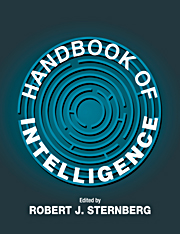Book contents
- Frontmatter
- Contents
- Preface
- Contributors
- PART I THE NATURE OF INTELLIGENCE AND ITS MEASUREMENT
- PART II DEVELOPMENT OF INTELLIGENCE
- PART III GROUP ANALYSES OF INTELLIGENCE
- PART IV BIOLOGY OF INTELLIGENCE
- PART V INTELLIGENCE AND INFORMATION PROCESSING
- 13 Simple information Processing and Intelligence
- 14 Complex Information Processing and Intelligence
- 15 Artificial Intelligence
- PART VI KINDS OF INTELLIGENCE
- PART VII TESTING AND TEACHING INTELLIGENCE
- PART VIII INTELLIGENCE, SOCIETY, AND CULTURE
- PART IX INTELLIGENCE IN RELATION TO ALLIED CONSTRUCTS
- Author Index
- Subject Index
14 - Complex Information Processing and Intelligence
Published online by Cambridge University Press: 05 June 2012
- Frontmatter
- Contents
- Preface
- Contributors
- PART I THE NATURE OF INTELLIGENCE AND ITS MEASUREMENT
- PART II DEVELOPMENT OF INTELLIGENCE
- PART III GROUP ANALYSES OF INTELLIGENCE
- PART IV BIOLOGY OF INTELLIGENCE
- PART V INTELLIGENCE AND INFORMATION PROCESSING
- 13 Simple information Processing and Intelligence
- 14 Complex Information Processing and Intelligence
- 15 Artificial Intelligence
- PART VI KINDS OF INTELLIGENCE
- PART VII TESTING AND TEACHING INTELLIGENCE
- PART VIII INTELLIGENCE, SOCIETY, AND CULTURE
- PART IX INTELLIGENCE IN RELATION TO ALLIED CONSTRUCTS
- Author Index
- Subject Index
Summary
Theories of human intelligence must explain those complex human behaviors that are most commonly understood as its indicants. Thus, the central facts to be explained by a theory of intelligence must go beyond faster or more efficient processing of elementary tasks, for example, or the efficiency of biological processes and inherited structures, or the influence of other individuals, environments, or even cultures on abilities. Rather, a theory of intelligence must explain the writing of novels, the solving of complex mathematical problems, the designing of skyscrapers and microchips, and the myriad other forms of complex cognition valued by society. In short, an understanding of how individuals solve complex tasks and an explanation of why they differ so markedly in their ability to do so are in fact central to any theory of intelligence.
COGNITIVE TESTS AS COGNITIVE TASKS
But where to begin? There are many thousands of complex tasks, each of which may be considered an indicant of intelligence (especially by those who excel in accomplishing the task!). Correlational studies of human abilities offer a reasonable starting place because they have identified groups of tasks that consistently measure abilities viewed as indicants of intelligence – both by psychologists and lay persons.
- Type
- Chapter
- Information
- Handbook of Intelligence , pp. 285 - 340Publisher: Cambridge University PressPrint publication year: 2000
- 48
- Cited by

